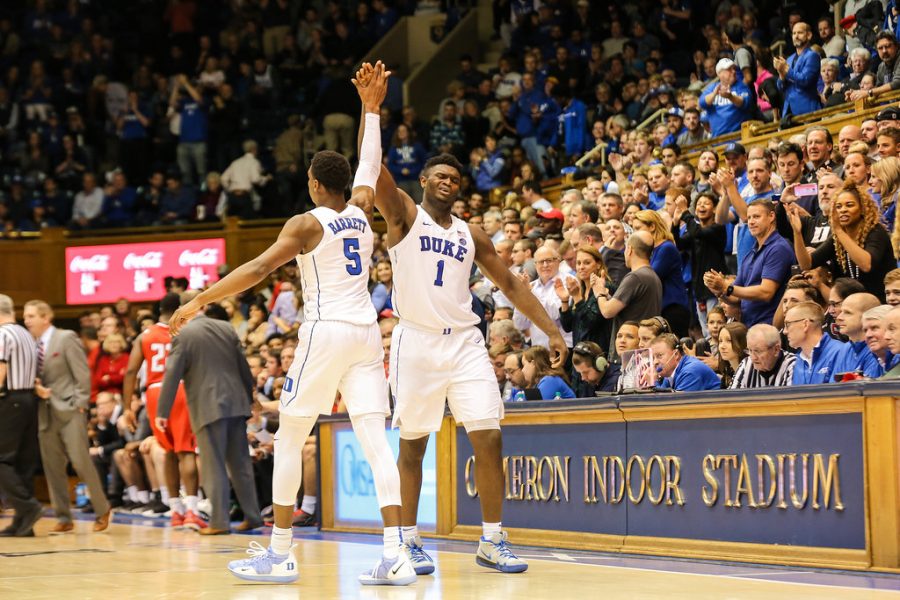NCAA Should Allow Athletes to Make Money Off Their Likeness, Accept Sponsors
Photo Courtesy of Keenan Hairston
Duke guard RJ Barret and forward Zion Williamson celebrate during a timeout. NCAA players such as Williamson should allow their athletes to make money off their likeliness and sponsors.
June 3, 2019
As the major college sports season comes to an end, there will be about six months of calm until fans and the media argue once again whether to pay NCAA athletes.
The debate on whether these athletes should be eligible to be paid or not will never come to a solution that will satisfy both sides; the NCAA does not want to lose any money paying their athletes, but many athletes are not satisfied playing and not making anything off the money they generate for the NCAA.
The solution to this problem is simple: the NCAA needs to allow their athletes to make money off their own likeness, so they don’t have to pay the players themselves.
If athletes were allowed to sign brand deals and shoot commercials, there would be a fair compensation for the players and it would not take away from the NCAA’s bottom line.
In the NCAA, the top one percent of athletes are the mistreated population. To end this quarry without having to pay the 99 percent, the NCAA needs to loosen their rules on allowing athletes to make money off their likeness. Currently, an NCAA athlete cannot receive compensation for appearing in commercials or signing endorsement deals, unless compensation is for the expenses of the event such as meals or lodging, according to the NCAA website.
If the NCAA were to change this rule to allow athletes to profit off these opportunities, they wouldn’t lose money paying their athletes and the top athletes would finally be making the money they are worth.
The NCAA’s argument against paying players is that they are already compensating their athletes through athletic scholarships, which normally range from $80,000-$240,00. However, the money that some star athletes generate for their schools makes their scholarships look miniscule. For example, former Texas A&M quarterback Johnny Manziel generated an estimated $37 million for his school in 2013, according to an article in The Week magazine from 2013, but he only received around $100,000 in scholarship money.
As the media constantly points out this pay discrepancy for star athletes, the average athlete is fairly compensated or overcompensated with their scholarships. The average NCAA football player is worth about $178,000, according to a Drexel and National College Players Association study. This value puts them into the range that their scholarships are worth. The majority of athletes in other sports are worth far less than their scholarships are, so the schools are already overcompensating them.
Average college athletes often acknowledge that they are not huge financial draws for schools but rather are happy to just continue playing the sport they love at a more competitive level.
“My motivation to continue playing college sports was that I wasn’t ready to give up playing soccer competitively,” Division 2 Frostburg State University Women’s Soccer commit Charlotte Davis said. “There was no need for the money, I wanted to continue to play and I definitely enjoy being in a team atmosphere and creating great relationships with other people.”
Lots of athletes also realize the value of their scholarships; many athletes would not be able to afford college without it and for the majority of athletes, the scholarships are worth more than they generate for their respective schools.
“I think it would be nice to be paid, but I’m getting money for school which is basically pay,” Division 1 Mount Saint Mary’s University Baseball commit Matthew McTighe said. “I think any type of scholarship you have to earn it. You worked to get that money, it’s like a reward for your work.”
In the NCAA, it is the star athletes who are the core of the argument among fans and the media. Instead of overgeneralizing and saying either all or no athletes need to get paid, it’s about time everyone puts an end to the debate and justly allow athletes going pro to make money off their likeness.




